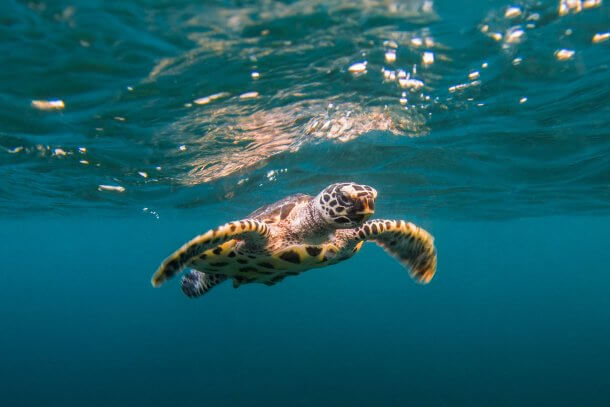07.06.2022 by Anete Ezera
The ocean is one of the most unexplored parts of the earth. The World Register of Marine Species has estimated that the ocean is home to around 700,000 marine species, a lot of them still unidentified. Also, the waters naturally regulate the temperature on our planet and have absorbed more than 90% of excess heat in the climate. Yet, due to plastic pollution and rising greenhouse gasses, the ocean’s health is rapidly declining. That’s why for the last 30 years on World Oceans Day, people aim to raise awareness of ocean-affecting issues and ways to protect it.

Are the oceans dying?
Over the last few decades, the global average temperature has rapidly increased. In consequence, the ocean’s temperature has also sharply risen. Currently, the ocean’s heat content up to 2000 m has increased to an all-time high of 20.4 °C (68.72 °F). The severe temperature increase has created extreme living conditions for marine life and caused coral bleaching. As a result, many ocean species are threatened with extinction in the next few years.
Warmer temperatures aren’t the only issues. Human-caused ocean pollution is critically affecting the ocean’s health. Each year 10,000 to 100,000 tonnes of plastic end up in surface waters. Thereon, the plastic finds its way into our oceans through streams and rivers. Plastic pollution poses severe threats to the ocean’s health and marine life. We all have seen shocking images of turtles tangled in plastic or of other animals that have consumed plastic waste by accident. Unfortunately, these aren’t isolated cases and most probably are quite common in today’s water environments.
Revitalizing our oceans
This topic on World Oceans Day 2022 is revitalization, focusing on collective action for the oceans. The United Nations in partnership with Oceanic Global created a 2-month campaign, where individuals, businesses, states, and organizations share videos of solutions they’ve implemented to help revitalize and protect our blue planet. Now, you can find some of the videos on social media platforms under the hashtag #RevitalizeTheOcean. The goal of the campaign is to raise awareness of initiatives currently taking place. Also, it aims to inspire others to make a change. In addition, the UN created an online space for organizations and researchers to share important statistics and stories to educate and inspire others to take action.
All in all, the oceans’ revitalization will require an effective and strong collaboration between nations. The water doesn’t know borders, so only collective action can make a great change for the better.
Explore Infogram Insights to discover more ways you can visualize newsworthy topics with our infographics.
Sign up or log in to Infogram to make an infographic about a topic that matters to you.
Get data visualization tips every week:
New features, special offers, and exciting news about the world of data visualization.